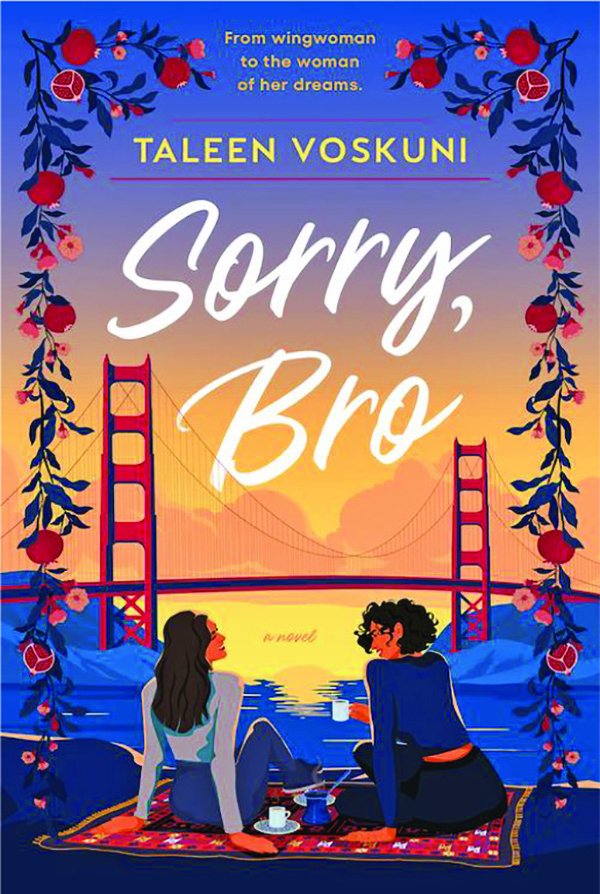
When I wrote the first draft of my romantic comedy novel, Sorry, Bro, I didn’t imagine that anyone beyond my sister and five trusted writing friends would read it. I had written a few novels before, and those six had been the extent of the audience. So now, seeing that thousands of people have purchased it, that my book is an Amazon Editor’s Choice pick and that it was favorably reviewed in the New York Times? An “out of body” experience.
When I was creating this piece, crafting the words at night after my child was asleep, it was still all mine. It started simply: this was a fun story I wanted to write. I had never written an Armenian story before, not really, and it turned out I had a lot to say. I wanted to show the humor in everyday family interactions—how Armenian families are so close as to be overbearing, yet loving and well-intentioned. I hadn’t seen the modern Armenian diaspora culture reflected in many books—though I had seen it through Armenian comedians—and I wanted to bring the reality of life as a first-generation San Franciscan Armenian to the page.
While writing, I compared myself to the other Armenian authors I had read. True artists, telling the story of the Armenian Genocide, weight to their words, poetry at their grasp. My prose is light, casual and infused with colloquialisms. There is liberal use of the word “like.” It didn’t feel important, in a global sense.
But as I was writing in the fall of 2020, the 44-day war in Artsakh broke out. I witnessed, for the first time, the silence of the world and of the media about this existential threat to Armenians. I always knew in theory that no one cared about us, but hadn’t had the misfortune to truly understand what that meant. And I got angry. I felt entirely powerless as I scrolled Twitter, Civilnet, or read biased articles written by journalists sponsored by Azeri petro dollars. But I realized there was one thing I could do: write this book. No one cared about Armenians, but maybe I could make them care. In the story, I included as much Armenian history as this genre would allow. I added a scene in which Turkish nationalists and genocide-deniers crash an Armenian Genocide lecture (an event which I’ve personally witnessed). In a romcom! I still had no agent, no book deal, no audience and gaining any of those was a pipe dream, but I wrote furiously, single-mindedly, toward my goal of getting this book on the shelves.
There is another aspect of the book that lends it some weight, and that is its role as a coming-out story. Sometimes I’m asked, “How did you decide to write this book?” or “Did you set out to write a romance between two women?” And the answer is: I have no idea. The idea came to me nearly fully formed, and it was always going to be a story about Nareh and Erebuni, two women falling in love, and why that is difficult in Armenian culture. This was, I felt, another gap in Armenian published novels—the lack of queer subjects. There were some books, but not many, that discussed queer Armenian issues, and I felt this type of story in particular was unexplored. For me to write something novel length, there has to be enough rich, uncharted territory (in my mind at least), and here was something I wanted to delve into. How could you reconcile your queerness and your Armenianness? How could you be both? I didn’t know the answer, so I wrote to find out.
How could you reconcile your queerness and your Armenianness? How could you be both? I didn’t know the answer, so I wrote to find out.
For those interested in the nitty gritty, I wrote during nap times and after my son went to sleep. I wrote some weekends when either set of grandparents were watching him. It took me about four months to finish a solid first draft. I entered a mentoring contest, won and was paired with the generous and talented Jesse Q. Sutanto, who had an eagle eye for how to improve my book. I spent another month on edits, then went on to query agents. I had queried twenty or so when I got my first offer, and I ended up with five agent offers. I went with the agent who had the sharpest eye for edits and made me feel most at ease, Katelyn Detweiler.
I’ve decided that getting a novel published is 70-percent hard work and 30-percent luck. So when my agent helped me land a book deal, with not just anyone, but the Berkley imprint of Penguin Random House, I counted myself immensely lucky. I wrote my book at the exact right time, when the Big Five publishers realized they wanted to start filling out their sapphic fiction rosters. To give you an idea, my imprint only published their first sapphic romance in 2020. Not a single one before then. And suddenly in 2023, Penguin’s marketing team ensured that this book landed in almost every bookstore in America.
Once early reviews of Sorry, Bro came out, I realized I was accomplishing one of my major goals with the book. Nearly every review mentioned some version of, “I knew next to nothing about Armenian culture” or “I learned so much.” By virtue of being a romance, through the accessibility of the language, the book opened up the story of the Armenian people to a whole new audience.
And I’m not done yet. I want to create a whole world of allies, who know Armenians, understand our struggle and will stand by our side when we call for help. I have more books to write, and with a little more of that elusive luck, perhaps they can be adapted to TV or film and reach a still wider audience. I’m hopeful, and more importantly, I’m going to keep pushing ahead.



Congratulations on a wonderful accomplishment and I sincerely hope your book becomes a huge success. Already receiving Amazon recognition indicates you’re well on your way. I hope you’re next book, however, might drop the LGBT theme and instead focus on the traditional aspects of being an Armenian-American. Writing about the “challenges” of young people dating and marrying non-Armenians would have been more aligned with the experiences of, especially, first generation while still achieving your goal of educating your readers about our history. I understand by instead choosing to add the LGBT aspect your book is added to another genre and may receive added attention but as you know we area people with strong traditions and even stronger religious faith. For this reason, I do wish you further success, I hope your next book will be more mainstream and I will not add this one to my library of Armenian-written and focused books.
Congratulations Taleen, for having your last book on Amazon Editor’s Choice and for being favorably reviewed in the New York Times and having a few thousand copies already sold.
It’s your last name and residence that also caught my attention. Are you related to the renowned Armenian journalist, editor and author Dikran Vosgouny, although his last name is spelled differently than yours? He lastly lived in San Francisco and passed away there.